Welcome to the second day of this course.
Today we're going over the process of picking a profitable niche.
After going through this level you should have a rough idea of what niche you'll use for your affiliate website.
Let's get into it!
Your 11-Day Email Schedule
- Day 1: Welcome to the 11-day Affiliate Course
- Day 2: How to pick a profitable niche
- Day 3: How to pick an affiliate product
- Day 4: Building Your Income-Generating Website
- Day 5: Building Your Income-Generating Website (Part 2)
- Day 6: Marketing Your Website: On-Page SEO
- Day 7: Creating Your First Content
- Day 8: Marketing Your Website: Off-Page SEO
- Day 9: How To Monitor Your Performance
- Day 10: Double Your Earnings With Email Marketing
- Day 11: Easy Wins While You’re Gaining Authority
Important* Make sure you have done all the previous steps
before going to the next lesson.
Resources Mentioned in This Lesson
- Moz SEO Toolbar (SEO Application)
- Answer The Public (Marketing Tool)
- ClickBank (Affiliate Market Place)
- Amazon (Merchant website0
- YouTube (Streaming website)
- Google Trends (Google tool)
What is a niche?
A niche is a distinct segment of a market, in other words, an "audience".
I always describe it as a group of people interested in an activity, product, or service.
A few examples of niches could be:
People interested in fishing poles (product) or short just saying fishing poles
People interested in golfing (activity)
People interested in getting fitness coaching (service)
When choosing a niche that fits you, you should be choosing something that is ideally an interest, a passion, or a hobby, but it could also be something that you would like to learn about.
Why is it important to pick a niche?
As an affiliate marketer, you recommend products to people but to get them to the point of them purchasing based on your recommendation they need to trust your judgment.
This is why focusing on 1 specific niche has value.
By covering a subject that’s related to 1 specific niche you’ll avoid being seen as a jack of all trades and instead be perceived as a specialist.
This doesn’t mean you have to become the leading expert on the subject but simply by covering it extensively, you gain credibility in people’s minds.
What are the characteristics
of a good niche?
Popularity
A niche that is a good fit for creating a website and earning money should be big enough to earn a profit from. There are millions of niches out there and hundreds are formed every day.
Finding a niche popular enough to create your business around shouldn’t be that hard. I’m going to show you exactly how you can do that.
Low competition
Affiliate marketing is one of the simplest methods for earning money online and because of that a lot of affiliate businesses are created every day.
This means other people are going to focus on niches. To succeed with affiliate marketing you’re going to have to pick a niche that other people don’t already dominate.
I’m going to show you a bit later in this lesson exactly how I determine if there isn’t too much competition (or too little).
Profitable
In 2020, I was planning to start my second affiliate website and I found a niche that blew my mind. It was insanely popular and there was no competition.
I thought I hit the jackpot.
To my surprise, I didn’t earn a single dollar through affiliate sales.
The niche was big but it wasn’t interested in buying any products simply because most people in this niche didn’t have the money for it.
It turned out I had no competition for that reason.
This is why confirming the buyer's intent is important before you invest in creating your website.
Does the niche have the budget to buy your products? Are they morally against the product you promote (or purchasing products in general)?Are they only buying in specific seasons of the year?
These are questions you should ask yourself when gauging buyer intent.
Interesting
If your website caters to your niche they’ll automatically find it interesting but there’s one more person that needs to find it interesting for your business to succeed.
That person is you.
Affiliate marketing websites are like mini long-term projects.
You built them up over time and slowly start to earn more and more money until you come in what Robert Greene calls a cycle of accelerated returns and experience a financial “boom”.
To get to this point, you’re going to have to invest time into covering and learning about niche-related subjects. This going to be very hard if you don’t like your niche.
It shouldn’t be a constant drag to work on your affiliate website because if it is you’ll likely quit before your website succeeds.
Find something you’re willing to learn more about.
How to find niches
There’s no exact science when it comes to finding niches but there are a few steps that the majority of affiliate marketers take before choosing a niche.
1. Listing your hobbies and Interests
The first thing I’d advise anybody that is looking for a profitable niche to do is to list their interests and hobbies.
Ask yourself:
What are your hobbies? ( Sports, Mountain climbing, Dirtbike racing, Martial arts, taking care of pets)
What do you like to read about or watch? ( Top Gear, NFL, Baseball, etc.)
What would you be interested in learning or learning about? ( Cooking, Boxing, Yoga, etc)
This should be your starting point.
2. Browsing Through Amazon Best Sellers
Amazon is one of the biggest merchant websites in the world and offers a variety of affiliate products you can recommend for a commission.
Luckily, Amazon has categorized all its products. You can click on "all" to view the categories and see if the category contains best-selling products.
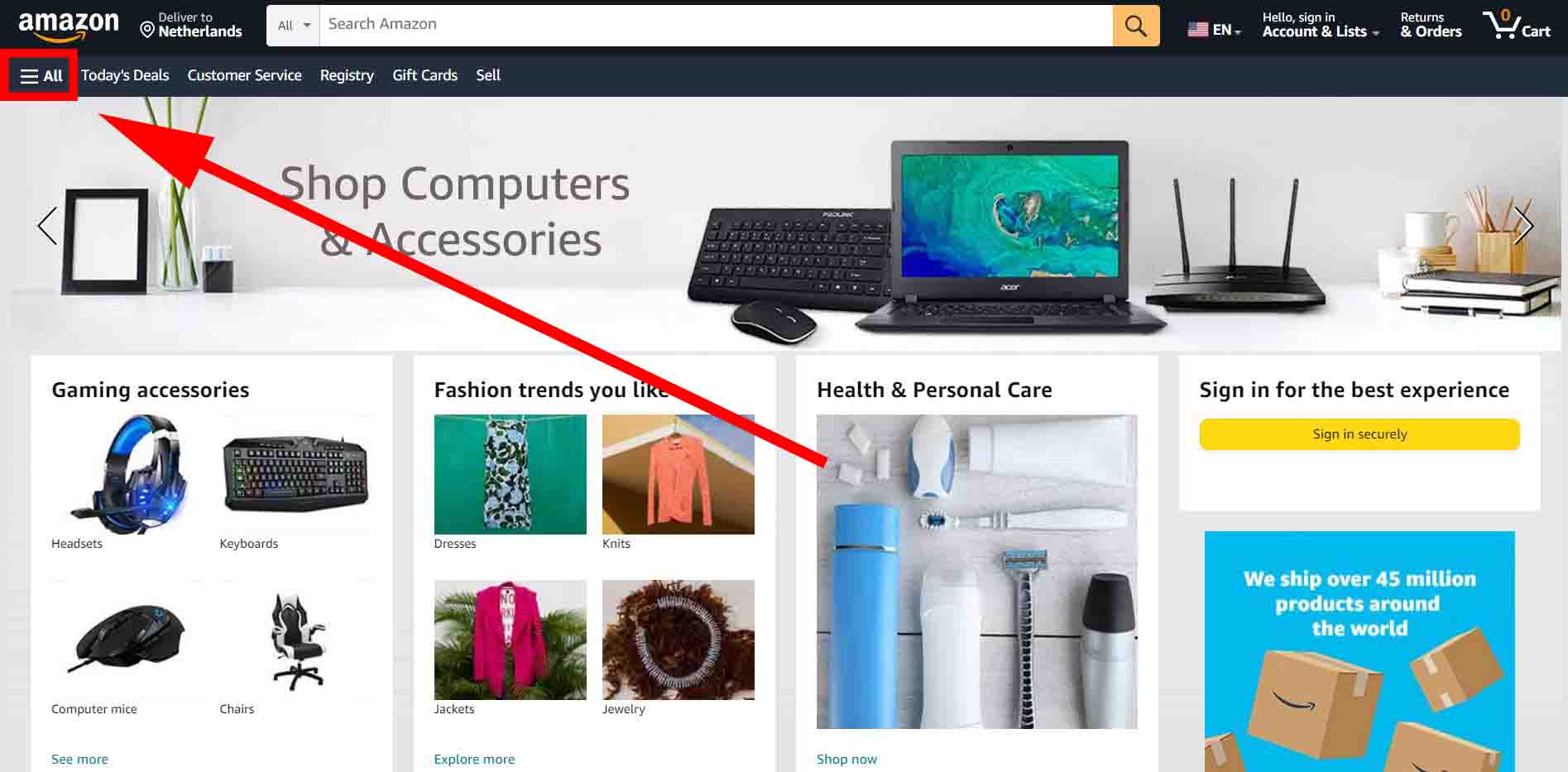

Aside from being a best-seller, the number of good reviews could also be a good indicator that a lot of people are interested in purchasing the product.

If you can find products that you find interesting and are in high demand you’ll have a good starting point for evaluating potential niches.
3.YouTube
YouTube is great for finding and narrowing down your niche.
Its search engine has a function called suggested searches.
The moment you start typing in a keyword it will not only try to finish what you’re typing but it’ll come up with all kinds of variations.
These suggested keywords are based on data it got from searches people have done in the past.
It’s safe to assume a decent number of people are looking for these variations because YouTube wants to provide its users with the best results.
So for example, let's say you take people interested in solar panels as a niche.
The solar panel niche may have too much competition after further competition research you can look at all the variations you can find on YouTube.
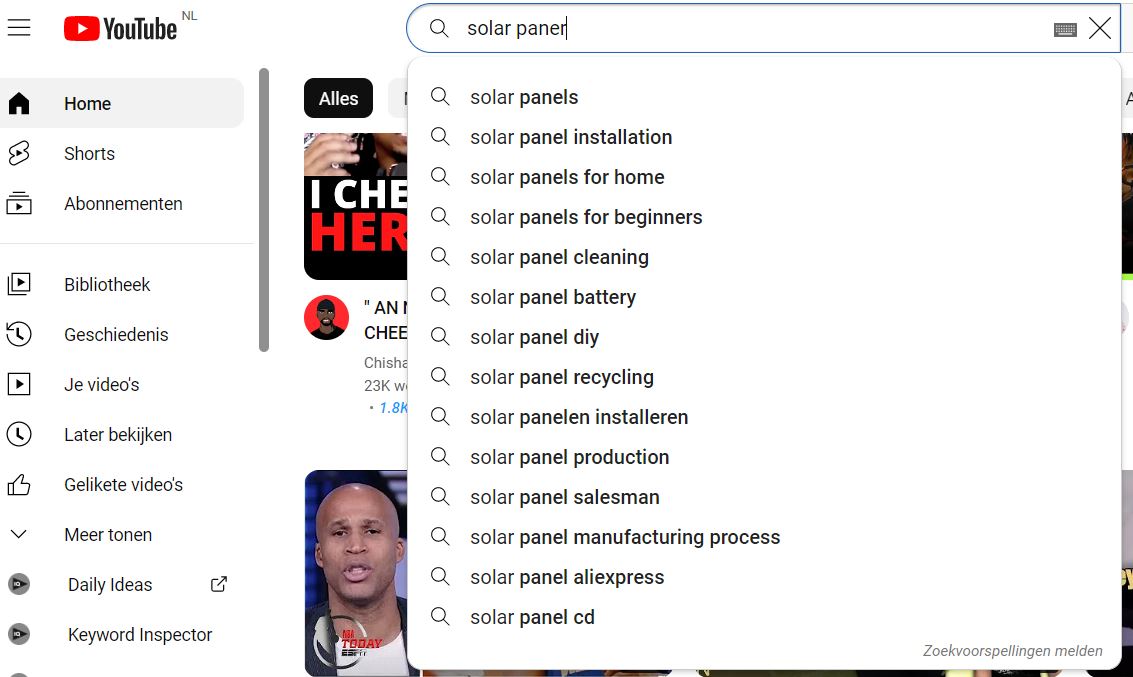
As you can see in the picture, a few new subniches are shown such as solarpanel cleaning and batteries.
4. Clickbank
Clickbank is one of the most popular affiliate marketplaces on the internet.
when you join you’ll get access to thousands of products that you can promote and they’re all categorized.
You can go through all the products and see which you’d be interested in promoting.
The cool thing about Clickbank listings is that they also share the performance of the products. Clickbank uses a metric called gravity.
The gravity score calculates how many unique affiliates are making commissions on a particular offer, with a higher emphasis on more recent product sales.
You can filter your searches by the highest gravity score once you’ve found a category you like.
What you do have to take into account when trying to find niches with the help of their gravity score is that it says nothing about the number of competing websites.
5. Google
Google is the biggest search engine in the world and just like YouTube it has a feature for showing you suggested keywords.
My favorite way of using it is by typing in [ Niche for] and having Google come up with variations.

Here I used weight loss and I see all kinds of niches appear that are viable since their sub-niches have a lot less competition than the broad weight loss niche.
Another option could be to look for affiliate programs of your listed interests like this [Interest + affiliate program] by doing this you can find all types of niches.

Just by typing in [dating + affiliate program], I found 2 interesting niches in the first result.
Christian dating and military dating.
This is very superficial research I’m performing but If I’d go through all the websites on the search result page I’d find a lot more dating niches probably.
Determining the popularity and sustainability of a niche
There are multiple ways to determine the popularity of a niche.
In the cases of niches found through Amazon or Clickbank, you can simply look for best sellers and the gravity score.
You can’t do this with niches you’ve found outside of those 2 platforms. This is why I’d recommend looking at Google Trends.
On this website, you can not only see if a specific search term is popular but also if it’s increasing or decreasing in popularity.
Ideally, you’d want a niche in which the popularity is stable over a long period and shows no signs of rapid decline.
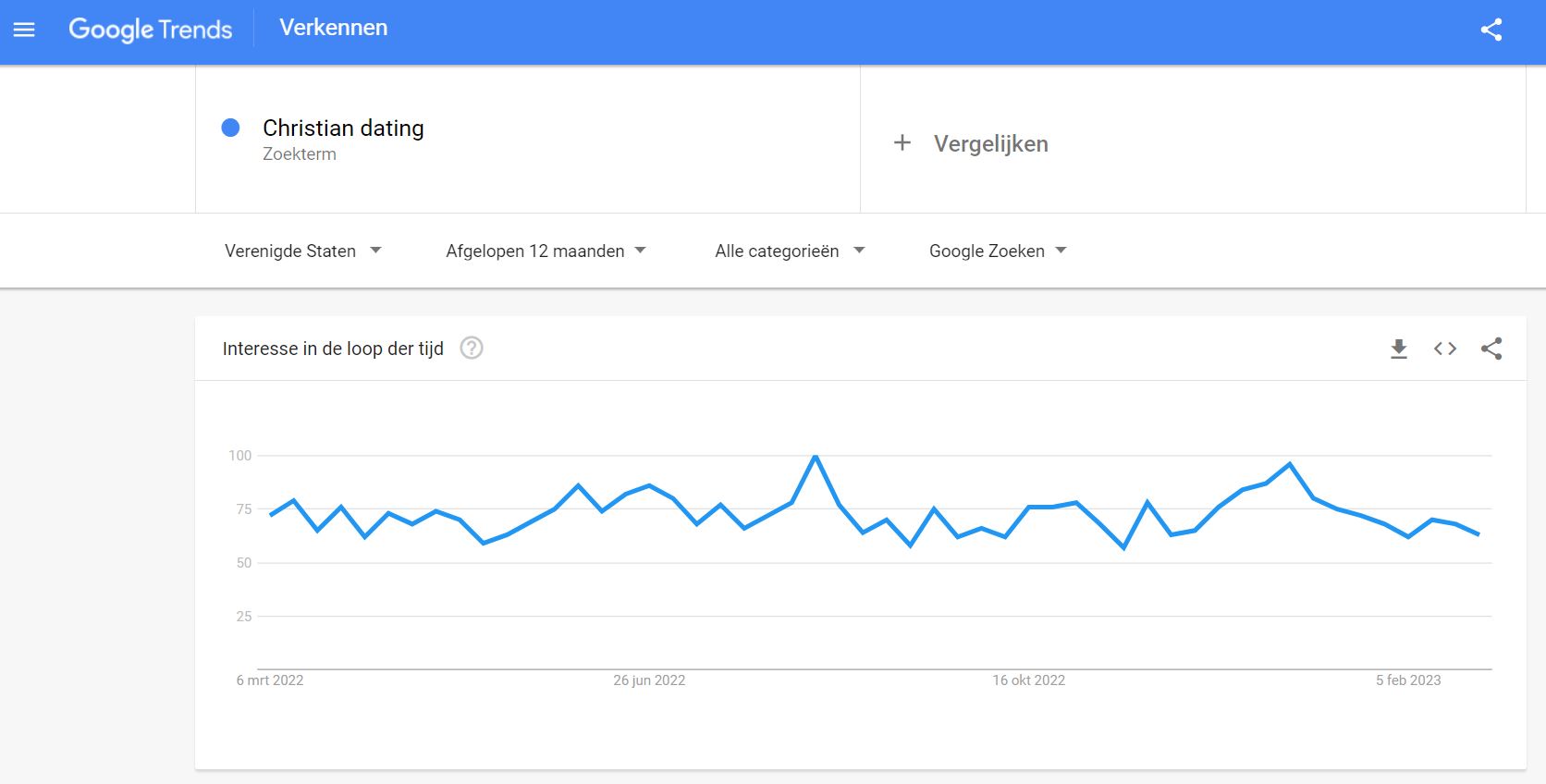
Competition Research
Competition is going to determine how much work you’re going to have to put into building your affiliate business.
Ideally, you’d want a popular niche with a low number of competitors or at the least competitors that don’t have a lot of authority.
We’re going to do our research by following 3 steps:
1. Identifying your competitors
2. Gauging how much authority your main competitors have3. Deciding whether it’s a good idea to proceed with the niche.
1. Identifying your competitors
There are 2 ways to identify your main competitors.
the cheap method that takes a bit more work. The method involves a bit more money but doesn’t require work.
The first is to locate your competitors through Google.
You take your niche and come up with related phrases and topics to your niche that you’d likely cover in the future if you chose that niche.
A great website you can use for coming up with these topics and phrases is answerthepublic.com.
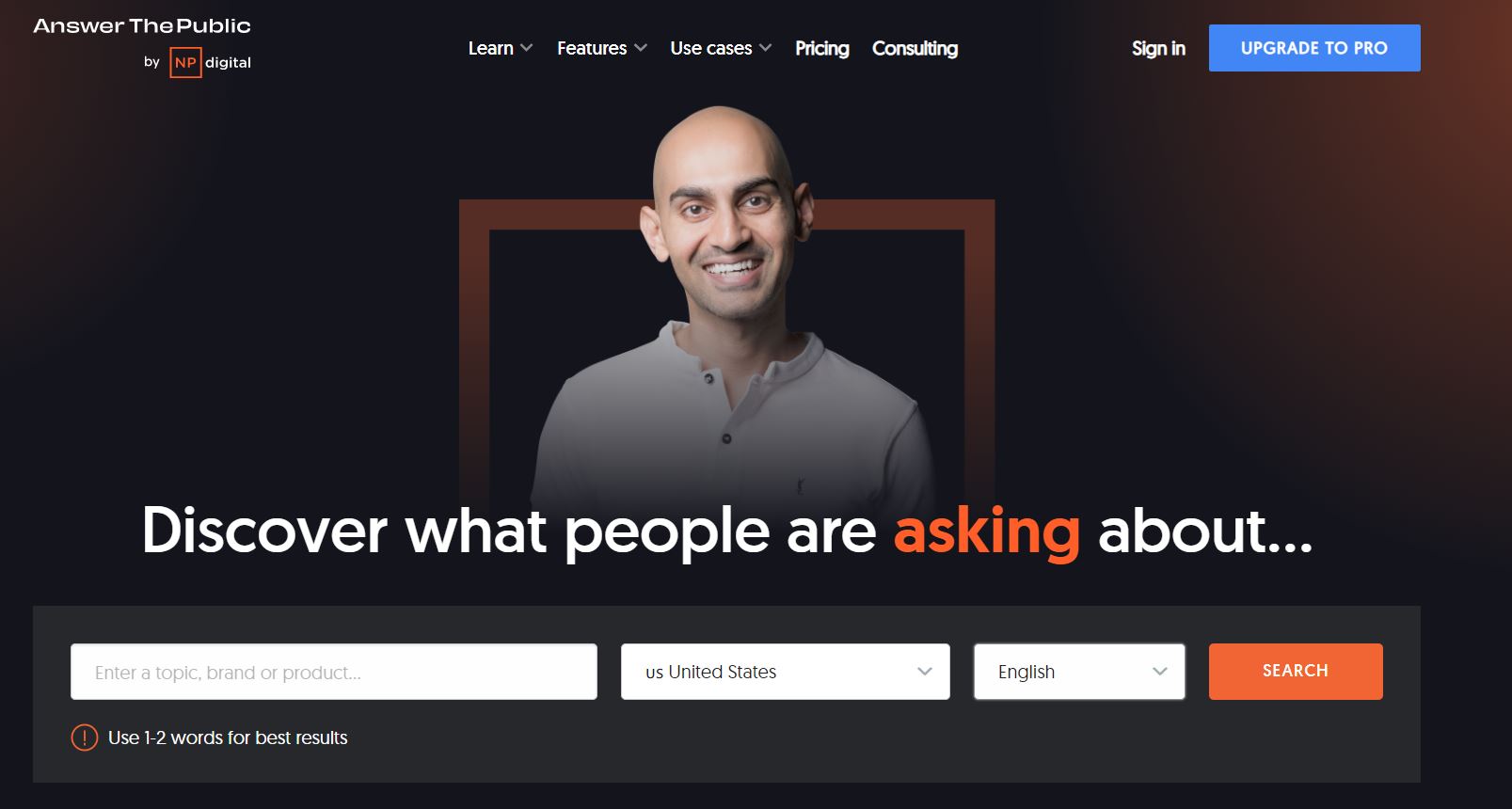
As you can see in the picture below, I went with “cold water fishing” as a niche after finding it as a variation on Google.
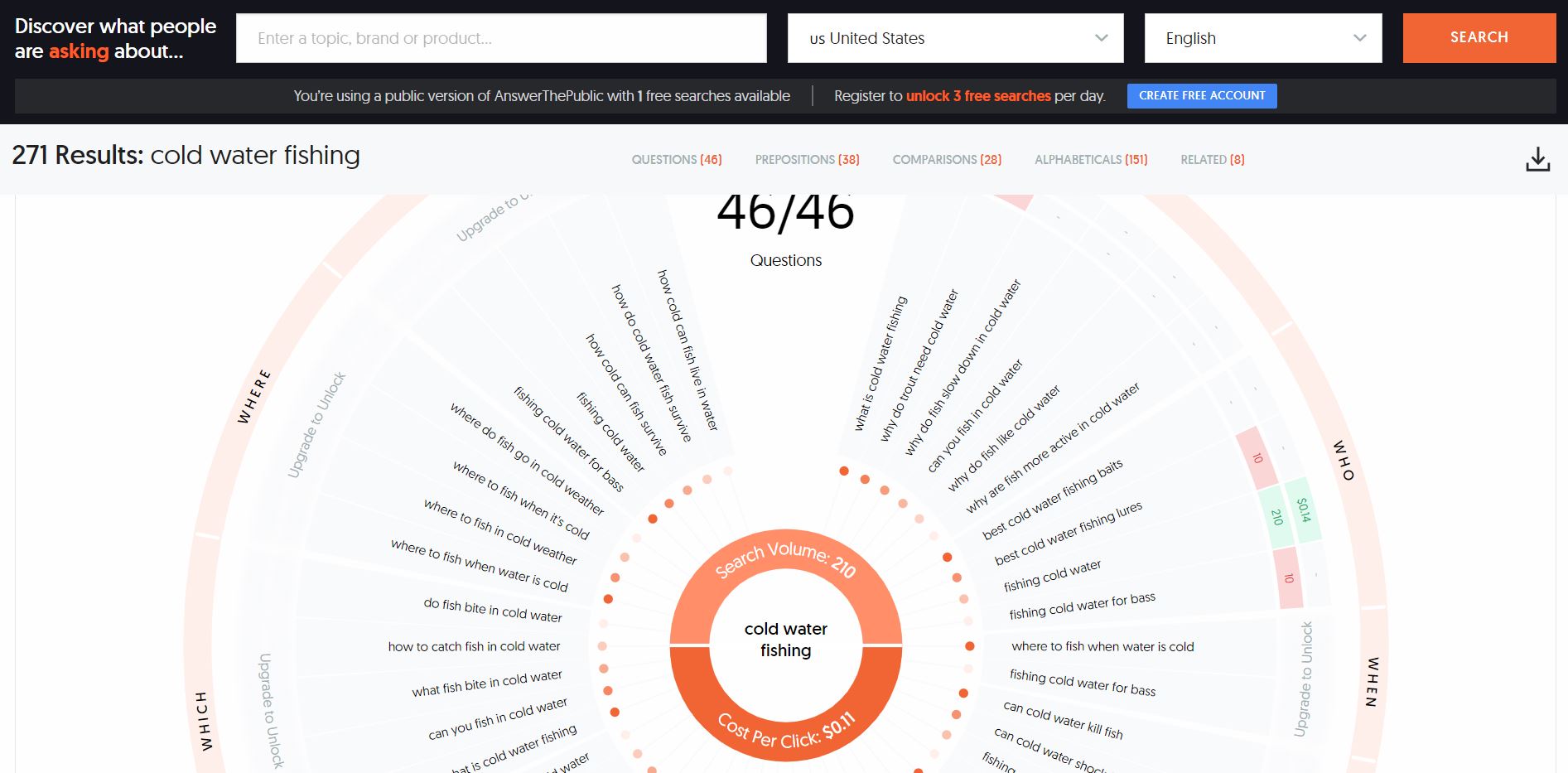
I typed the phrase into answer the public and all these related questions and subjects came up.
- What is cold water fishing?
- Why do trout need cold water?
- Best cold water fishing baits
- How to catch fish in cold water
- Where to fish in cold water
After getting 10 to 15 topics/ phrases, you’ll type them into Google and every website that appears on the search engine result page will be a competitor in some sort of way.

Focus on the first page because ideally, you want to get to the first page of Google ( I’ll explain why you want this in later lessons).
Now see if particular websites are dominating the first page of all your topics and phrases and make a list of your competitors.
As you can see from the phrase “cold water fishing” these are the website that you could consider your competitors:
- monsterbass.com
- mossyoak.com
- shopkarts.com
- and some others
2. Gauging how much authority your main competitors have
The more authority you have, the more likely it is that you’ll appear higher in Google.
This is why you need to know how much authority the competing websites have.
In most cases, you can pretty much get a vibe from looking at the websites. If all the websites helped millions of people in that niche and are world-renowned the niche might not be a good fit.
In some cases, it might be a bit less obvious because there are websites that look very simple but have a lot of authority.
In those cases, you can use a metric named domain authority to determine how much authority a website has (in Google’s eyes).
On moz.com you can download an extension for your web browser called the Moz toolbar. It allows you to instantly see the domain authority of every website.

After downloading and logging into your Moz account, your browser will look like this and your search engine result pages will look like this.

Type in your phrases and comments again and look at what the domain authority of most of these websites is.
Now you see how much authority these websites have in Google’s eyes.
3. Deciding whether it’s a good idea to proceed with the niche
If on every page all the websites have a domain authority above 50 it’ll take a lot more work to stand out in that niche.
You can still pursue the niche but I’d recommend going with an easier niche for your first affiliate website.
Ideally, you should go for a niche where in the related topics you find websites with domain authority of 10, 20, and 30 on the first page.
There seems to be some potential with the cold water fishing niche, from what I can see here.

This doesn’t mean every website on the results pages should have domain authority levels between 0 and 30 but if you see them pop up now and then, then that’s proof that you could get there as well.
Calculate how long it’ll take to rank
At the moment, I’m still creating the module for this so it’ll be added to the course as soon as possible.
Examples of niche websites
When I released the first version of this course, I’d get a lot of questions about showcasing examples of niche websites.
So before we get into the actual tasks for today I want to leave you with a few examples of niche websites.
You’ll notice some look very advanced while others have a very simple look. Both the simple and the advanced look can work.
Some of the most high-earning affiliate websites I know look like simple blogs.

Niche: People interested in earning money online
Problem: Not having knowledge about where to start with making money.
Solution: Educational Blog Posts and make money affiliate programs.

Niche: People interested in roofboxes
Problem: Not having knowledge about roofboxes they should buy
Solution: Educational Blog Posts and Roofboxes from affiliate programs such as amazon

Niche: People interested in Golfballs and Golf in general
Problem: Not having knowledge about Golfballs and other Golf gear
Solution: Educational Golf Blog Posts, Golf Balls, Golf Shoes, and Golf Clubs from Golf affiliate programs
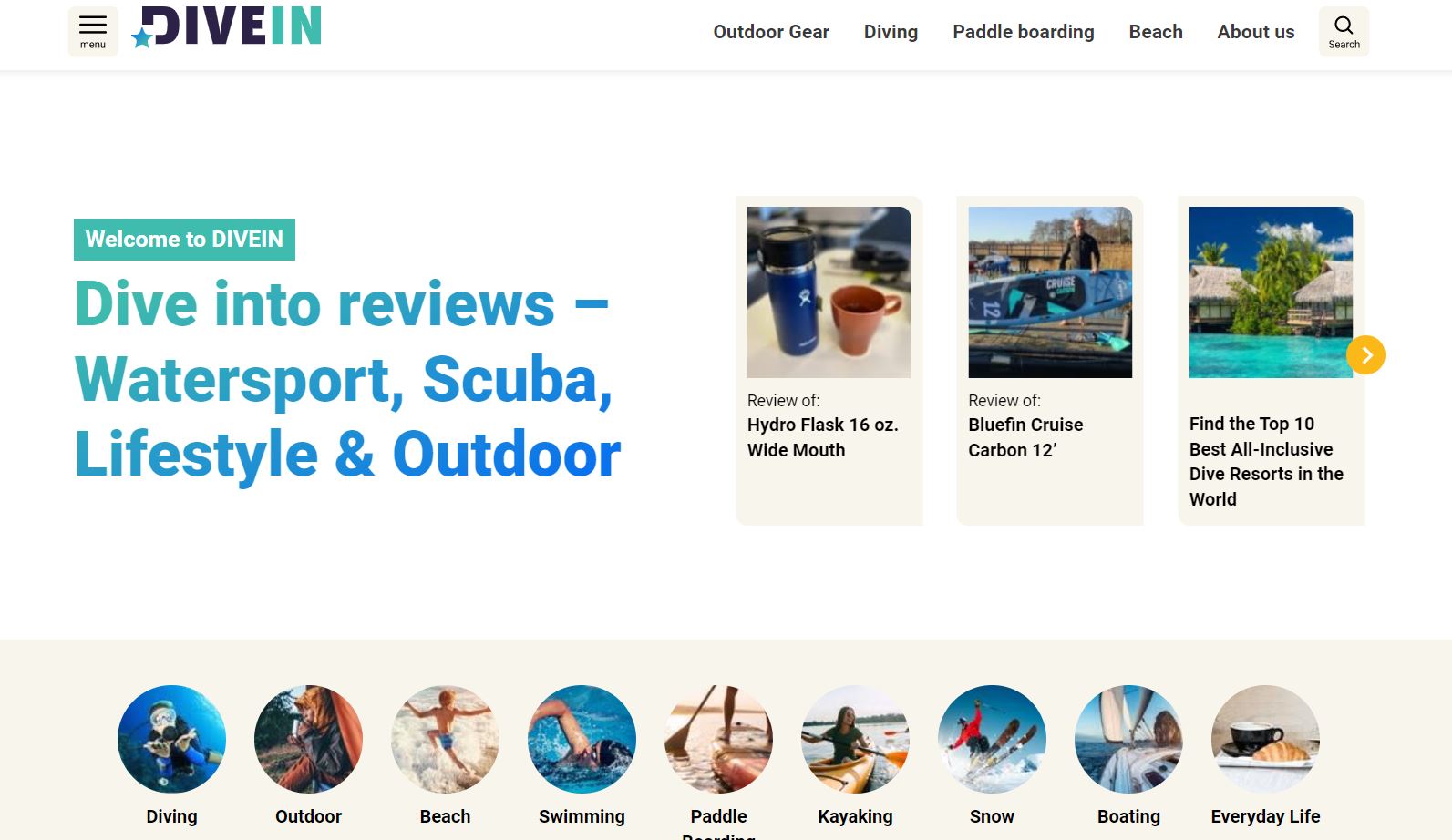
Niche: People interested in Watersports and Scuba
Problem: Not having knowledge about Watersports and scuba-related subjects
Solution: Educational Blog Posts and Watersport-related products from affiliate programs
Task For Today: Choose your direction
Task 1: List your interests
We want you to select the niche that interests you most and gets you the most excited.
Here are a few example niches out of 1,000's potential ones:
- Natural Skin Care
- Learn How to Play Basketball
- Starting an Online Business
- Learn Sand Art
- Baby Feeding
- Wine Making
- Cryptocoin Investing
- How to Write Faster
- Black and White Photography
- Go Kart Racing
- Make-up Tutorials
There are so many directions
Task 2: Use at least 1 of the platforms to continue brainstorming topics
It doesn’t matter if it’s Amazon, Clickbank, or YouTube. Try to find 2 niches you might find interesting to succeed with.
Task 3: Find some related phrases and topics related to your niche and pinpoint competitors
Use Answer The Public to find related phrases and questions related to your niche. Ideally, find at least 8 phrases or questions.
Pinpoint your competitors in the Google search result pages by typing them in the search bar.
Task 4: Download the Moz toolbar and research your competition (It’s free!)
Download the Moz toolbar and log into your Moz account.
Now go back to the search result pages and look up the DA (domain authority) of all the websites on the first page.
If you can find some websites with a DA between 0 and 30 in the results, you probably have a winner.
After doing these tasks, you should have a good idea of what niche you could focus on.
You don’t need everything I mentioned in this lesson to be perfect but get at least 3 of the 4 characteristics right.
I hope you’re excited because, in the next lesson, we’re going to start building your online affiliate headquarters.
See you tommorow!
© 2023. Real Digital Success, All rights reserved.
